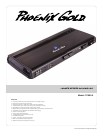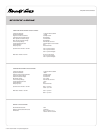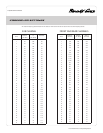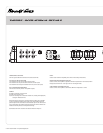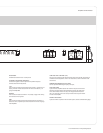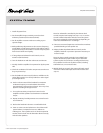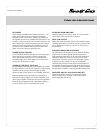
Amplier Owner’s Manual
© 2011 Phoenix Gold • www.phoenixgold.com
TROUBLESHOOTING
NO POWER:
Check voltage at amplier with a DMM (volt meter), +12v
and R (with head unit on) the voltage should register
between 12.2V and 14.6V when using the ground lead of
the amplier. Check fuse at amplier and at the battery. Use
a meter to verify connection from one end of the fuse to the
other, breaks may not always be visible. If the fuse is blown,
check the power wire and also the amplier for a short. If
the short is in the amplier itself, see your Phoenix Gold
dealer. If no short is present, replace the fuse.
POWER WITHOUT SOUND:
Turn the amplier o and check all input and output signal
cables and power connections. Check the speakers for
shorts with a DMM (volt meter) or by connecting them
to another audio source. After making sure everything is
correct, turn the amplier on again.
POWER BUT PROTECT LED IS ON:
The red PROTECT LED lights when the amplier shuts down
for either thermal or over-current protection. A high internal
amplier operating temperature will trigger thermal
shutdown: after it cools about 5°C, the amplier will restart.
A shorted speaker lead or operation into unusually low
impedance loads will trigger over-current shutdown: cycle
power at the amplier remote terminal to restore operation.
Check for shorted speaker wiring or damaged speakers or
crossover systems if over-current shutdown occurs.
NO SOUND FROM ONE SIDE:
Check the balance control in the head unit. Check speaker
connections. Check signal input connection.
VERY LOW OUTPUT:
Check your head unit’s fader control or the amplier’s input
sensitivity level. Make sure subsonic frequency control is not
set too high and LP frequency control is not set too low at
the same time.
FREQUENT AMPLIFIER SHUTDOWN:
This indicates chronic amplier thermal shutdown because
of operation at consistently high internal temperatures.
High operating temperature can be caused by inadequate
ventilation. Make sure you are not running a lower than
recommend impedance. Also check for damaged speakers
or passive crossover systems. Finally, chronic thermal
shutdown may result from otherwise normal operation of
the amplier at elevated output power levels, which can be
resolved by providing additional amplier cooling, installing
a higher-power amplier, or reducing amplier output level.
AMPLIFIER QUICKLY CYCLING ON AND OFF:
Check the amplier’s connection to the battery. Check
battery voltage. If low, recharge or replace the battery.
Check all ground connections.



